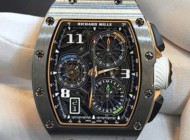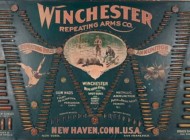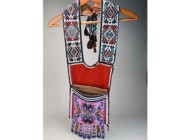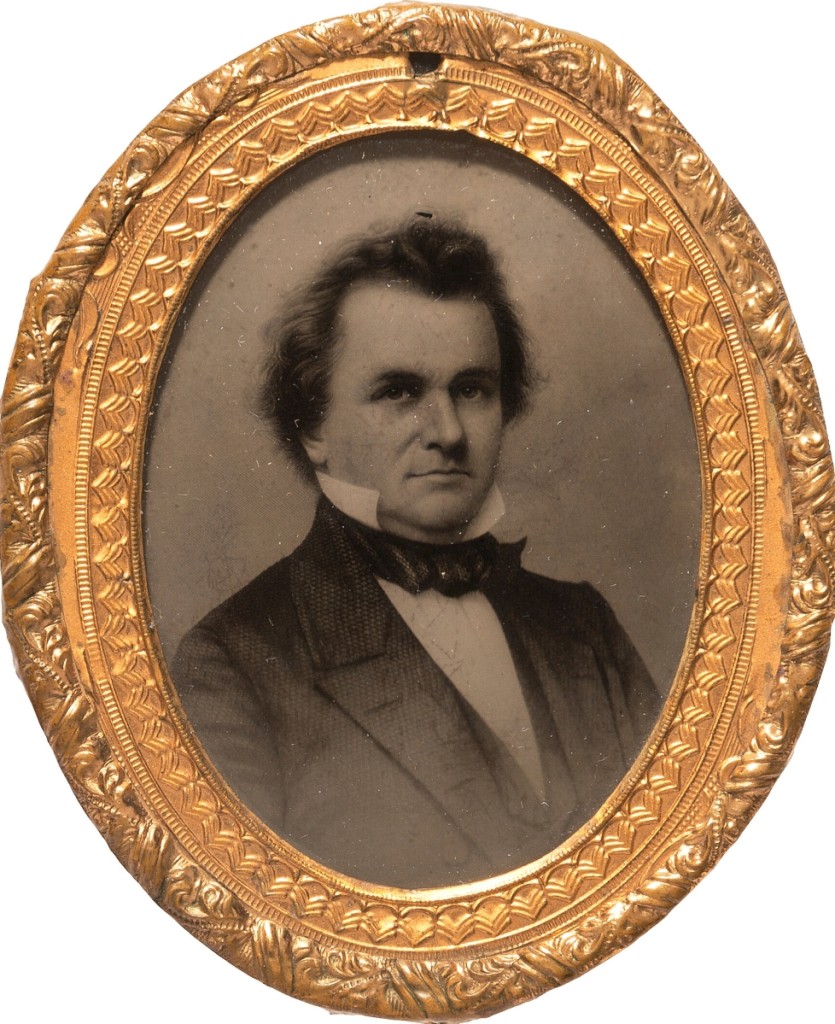
One of less than half a dozen ambrotypes of Stephen A. Douglas made by George Clark in 1860 from Matthew Brady’s photograph are believed to exist. This example also realized the sale’s top price of $118,750, nearly five times its estimate.
Review by Madelia Hickman Ring, Photos Courtesy Heritage Auctions
DALLAS – On March 19-20, Heritage Auctions offered the J. Doyle Dewitt Americana and Political collection, a sale of 387 lots that was offered over two days, the second day being online only. It was the first of at least two auctions that set a high bar for future events with a cumulative total of $1,883,533, about $1 million above expectations. Lots were offered with no minimum bids; consequently, the sale had a sell-through rate of 100 percent.
Dewitt (1902-1972) worked for Travelers Insurance Company, ultimately becoming president, director and chairman of the board. He also served as a director of Chase Manhattan Bank and the Hartford National Bank and Trust Co., as well as several other New England companies. His collection of political Americana – considered by many to be second in historical significance only to the collection of the Smithsonian Institution – had been in storage for about 20 years, according to Curtis Lindner, Heritage Auctions’ director of Americana.
“The collection had some amazing things; we wanted to have something for everyone’s tastes and pocketbooks but little did we know things would sell for what they did. People were really excited. [The collection has] been talked about for decades and people have been chomping at the bit to have the opportunity to acquire things with his provenance; it carries some cachet. It just shows that though we have inflation, collectors will still go after what they want.” He acknowledged the majority of the buyers were in the United States.
Two lots achieved the sale’s highest result of $118,750. The first to set the bar high was a rare silk political ribbon featuring the faces of Stephen A. Douglas and Herschel Vespasian Johnson, who were the Democratic ticket’s candidates for president and vice president in the 1860 election. The images taken by Mathew Brady were exceptionally strong and unblemished; they were featured on a 7-by-2-inch ribbon that was complete and untrimmed. It is the first example of a Douglas/Johnson jugate ribbon to come to auction in 15 years and is one of very few known. Lindner said he thought the price was a record for any political ribbon.
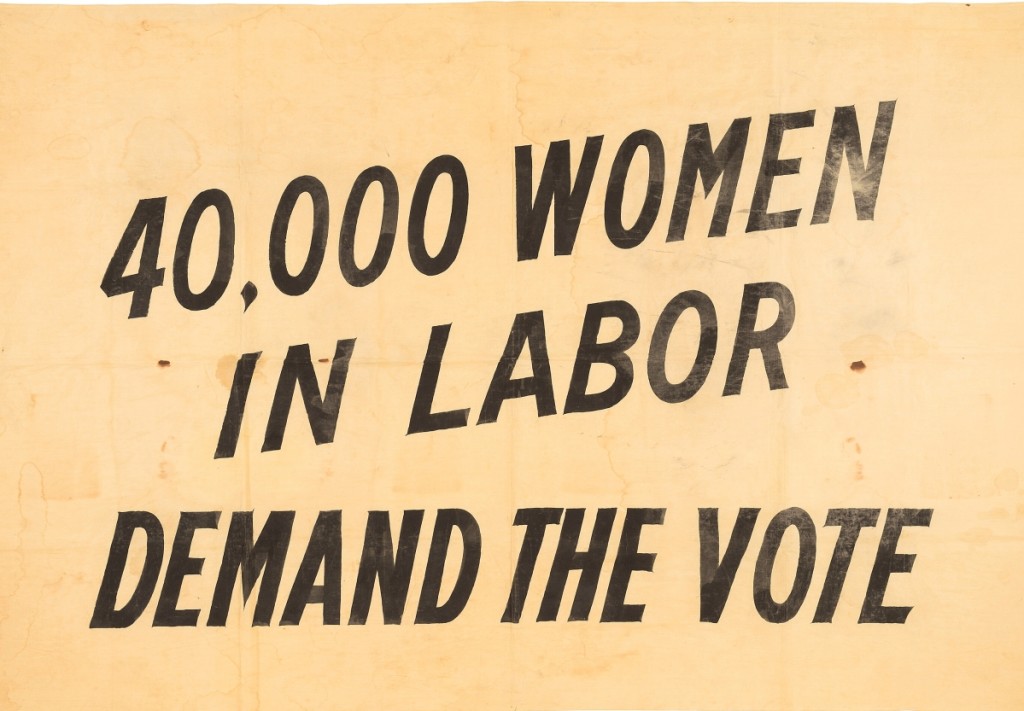
Women’s suffrage material was in comparatively short supply in the sale with only four lots on offer. This 36-by-54-inch banner offered a defiant message that bidders responded to. It finished at $26,250.
A few lots later, an ambrotype badge of Stephen Douglas, made by George Clark in 1860 from the same portrait taken by Mathew Brady, hit the same high number of $118,750. The badge is identified with printed cardboard verso, “For President/Hon. Stephen A. Douglas/Manufactured by/Geo. Clark, Jr. & Co./Ambrotype Artists/No. 59 Court Street/Boston.” Because of the frail nature of ambrotypes, which were subsequently discontinued in favor of the more durable ferrotype, only a few other ambrotypes of Douglas are believed to exist.
The companion to the Douglas ambrotype was that for Abraham Lincoln, also made by George Clark from the Mathew Brady photograph taken during Lincoln’s Cooper Union campaign speech. Not only did this ambrotype retain its original cardboard insert inscribed “For President, Hon. Abraham Lincoln,” as well as advertising for the manufacturer, Geo. Clark Jr & Co. of Boston but a remnant of a red, white and blue ribbon bow that had been inserted through the vertical pin was also still attached. It fetched $26,250.
Earlier in the sale, a baseball themed Currier & Ives cartoon that the catalog described as “the best political cartoon of the 1860 election by virtue of its connection to the formative years of baseball” hit a home run with bidders and rounded the bases for $81,250, the second highest price of the event and a value Lindner believed was a record for a political cartoon. Despite some physical condition issues, the bold text and depictions of the political figures were still in vibrant colors.
Another political cartoon that drew big money and $25,000 was an anti-Thomas Jefferson cartoon from 1793 that depicted the antifederalists as a motley group. Jefferson and James Madison are credited with forming the first opposition party, the Democratic Republicans or anti-Federalists, in 1791, a time that saw various partisan cartoons, all of which the catalog stated are “prohibitively rare.”
A folk art banner depicted John C. Frémont, the first Republican nominee for president of the United States in 1956 and founder of the California Republican party, and his wife, Jessie Benton. Each shown riding a spirited horse and brandishing whips. The banner was included in Herbert Ridgeway Collins’ Threads of History: Americana Recorded on Cloth 1775 to the Present and measured 28-1/8 by 24-3/8 inches. It made $68,750, rounding out the top three prices of the sale.
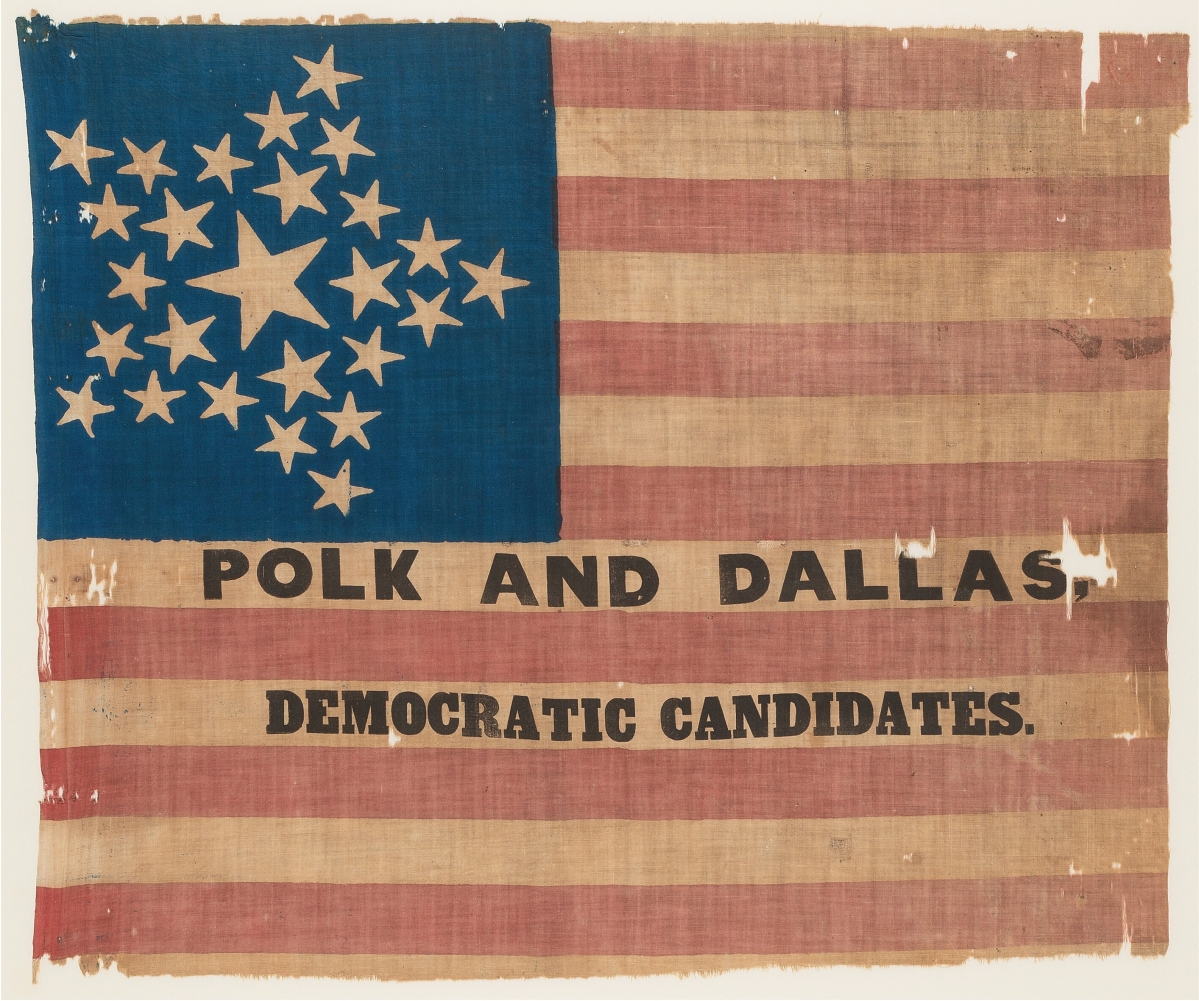
James K. Polk has always been a magic name for political collectors, as his campaign novelties of all types range from scarce to very rare, and political flag banners are considered the most prized. It is no surprised, then, that this Polk campaign flag flew to $57,500.
Given the rarity of political collectibles from the campaign and presidency of 11th president, James K. Polk, those items have always been hotly pursued by collectors. The sale featured nearly a dozen articles, ranging at the top end at $57,500 for a campaign flag down to a miniature band box lined with campaign newspaper that topped off at just $325. The flag related to two examples referenced in Threads of History; while it had some losses, fraying and fading, the rarity of the piece kept bidders on the line.
The sale offered a number of pieces related to the campaign and presidency of William Henry Harrison (1773-1841), whose brief presidency ended just one month after his inauguration. Leading the group of ribbons, buttons and banners was a 1¾-inch diameter sulphide badge with pewter rim that depicted on one side, a profile bust within the words “Maj. Gen. W.H. Harrison / Born Feb.9.1773” while the reverse showed a log cabin surrounded by an inscription “The Peoples Choice / The Hero Of Tippecanoe.” Bidders pushed it to $32,500.
Novelties associated with Jefferson Davis (1808-1889), president of the Confederate states from 1861 to 1865, are exceptionally few and rare. This is because of the meager resources and limited manufacturing capabilities of the wartime South that were generally reserved for the fledgling Confederacy’s very survival. Out of dire necessity, the production of military goods took precedence over generating “extras” such as political memorabilia, so the sale provided an unparalleled opportunity for collectors, who had five pieces to do battle over. Bringing $30,000 each was a 6½-by-4¼-inch inaugural badge with rosette, and a 24-by-18-inch “Don’t Tread of Me” flag that was also illustrated in Threads of History.
Lindner said the next session of works from Dewitt’s collection would be offered in October.
Prices quoted include buyer’s premium as stated by the auction house. For information, www.ha.com.













